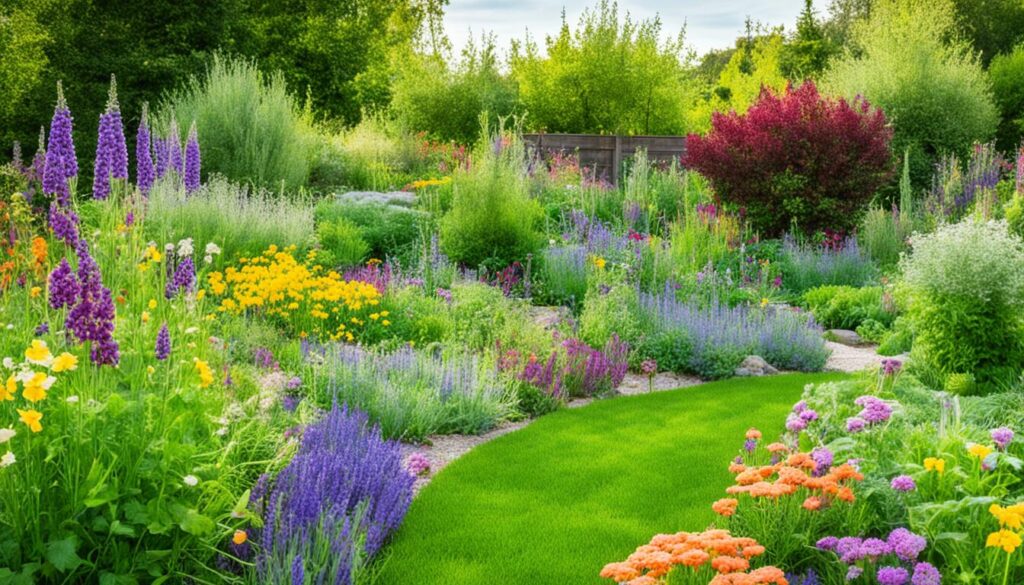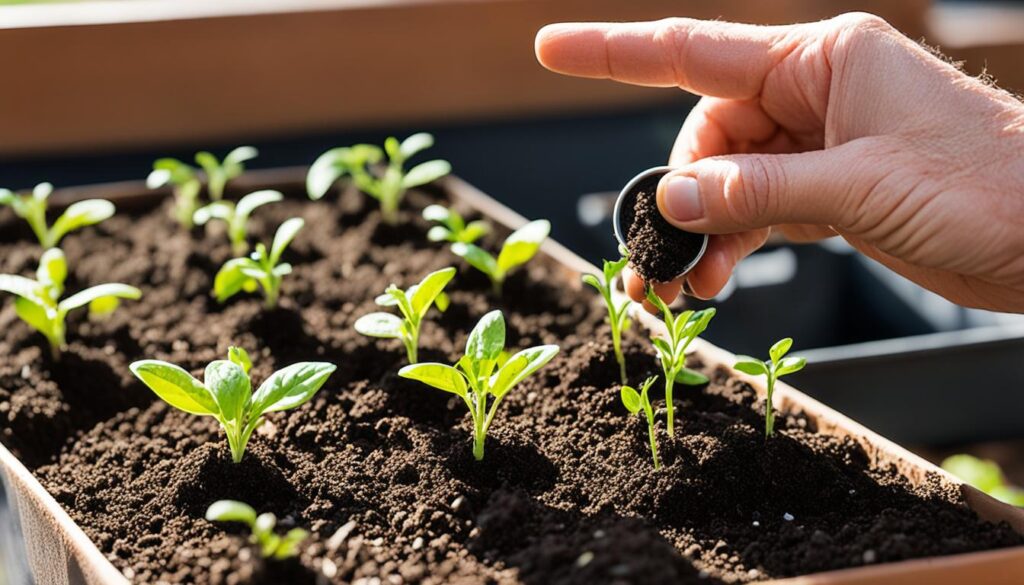Troubleshooting Herbal Garden Problems: Solutions for Beginners
Are you a beginner gardener having trouble with your herb plants? You’re not alone. Starting a medicinal herb garden can be tough, especially for new gardeners. But don’t worry! This guide will help you fix common garden problems and grow a beautiful garden.
Key Takeaways
- Discover how to identify and address common problems affecting your herb plants.
- Learn the essential resources and techniques for starting and maintaining a thriving medicinal herb garden.
- Explore step-by-step guidance on planning, planting, and caring for your herbal haven.
- Uncover solutions to troubleshoot common challenges and keep your herbs healthy and happy.
- Master the art of harvesting and preserving your herbal bounty for year-round use.
Common Challenges in Beginner Herbal Gardens
Starting a medicinal herb garden can be tough, especially for those new to these plants. Two big challenges are identifying common ailments and herb needs and navigating the unfamiliar territory of medicinal herbs.
Identifying Common Ailments and Herb Needs
First, look at the health issues in your family, like allergies or skin problems. This helps you focus on growing herbs that meet your needs. By knowing your common herb ailments and herb needs, you can make a garden that really helps you.
Navigating Unfamiliar Territory of Medicinal Herbs
The world of medicinal herbs can seem overwhelming at first. But, start with trusted books and small steps to learn more. This way, you can grow a medicinal herb garden with confidence.
With time and effort, you can overcome the challenges of beginner medicinal herb gardening. You’ll create a garden that supports your family’s health.
Essential Resources for Starting a Medicinal Herb Garden
Starting a medicinal herb garden is both exciting and rewarding. It’s crucial to have the right resources to guide you. Two top books for beginners are “Medicinal Herbs: A Beginner’s Guide” by Rosemary Gladstar and “Healing Herbal Infusions” by Colleen Codekas.
Recommended Books for Beginners
“Medicinal Herbs: A Beginner’s Guide” by Rosemary Gladstar is a must-have. It covers many common medicinal herbs, their uses, and how to make tinctures, salves, and more. This book is perfect for those new to medicinal herb gardening.
“Healing Herbal Infusions” by Colleen Codekas focuses on herbal infusions. It teaches you how to grow and use herbs to make tasty and healthy drinks. You’ll learn to make teas, tonics, and elixirs that are good for you.
Exploring Recipes and Remedies
Check out the recipes and remedies in the recommended books. This will help you understand how to use medicinal herbs in real life. It’s a great way to try out different remedies before adding them to your garden.
Trying out teas, balms, or tinctures lets you see which herbs are best for your family. This helps you plan your garden with your health goals in mind. It makes your medicinal herb garden more personal.
“Embracing the power of medicinal herbs is a journey of discovery, where each step leads to a deeper understanding of the natural world and our own well-being.”
Planning Your Herbal Garden: A Step-by-Step Guide
When planning your medicinal herb garden, start by picking the herbs you want to grow. Look at recipes and remedies you like to make. Make a list of the herbs you need for these recipes. This ensures you have everything for teas, tinctures, and salves.
Noting Herbs for Desired Recipes
If you’re planning your medicinal herb garden in the off-season or late in the season, you might not have all herbs. Consider buying small amounts of herbs you want to try. This way, you can test them before growing them in your garden. It helps you pick the most valuable herbs for your garden.
Testing Herbal Remedies Before Planting
Testing herbal remedies before starting your medicinal herb garden is smart. It lets you know which herbs to grow. By trying small amounts, you can focus on the most important and versatile plants for your garden.
For a successful medicinal herb garden, plan ahead and choose herbs that meet your needs. Research and test your recipes and remedies. This will help you start a thriving medicinal herb garden.
Choosing the Right Herbs for Your Needs
When planning your medicinal herb garden, picking the right herbs is key. You should think about your family’s health needs and likes. Consider the ailments you want to tackle and your local growing conditions. By choosing herbs for your medicinal garden wisely, you can grow a collection that boosts your wellness.
Begin by selecting herbs for wellness that fit your family’s health issues. Are you looking for stress relief or natural help for digestion? List the health concerns you want to tackle. Then, look into the herbs that can help with those issues.
| Herb | Medicinal Properties | Common Uses |
|---|---|---|
| Chamomile | Anti-inflammatory, antioxidant, sedative | Reducing anxiety, promoting sleep, treating digestive issues |
| Echinacea | Immune-boosting, anti-viral, anti-inflammatory | Preventing and treating colds and flu, reducing inflammation |
| Lavender | Calming, sleep-promoting, anti-anxiety | Relieving stress and anxiety, improving sleep quality |
Think about your local growing conditions when planning your medicinal herb garden. Check the sunlight, soil, and moisture needs of different herbs. This way, you can make sure they grow well in your garden. By matching your herbs with your garden’s conditions, you’ll get the most health benefits from your medicinal herb garden.

Choosing the right herbs for you is a process that needs research, trying things out, and knowing your family’s health goals and garden’s limits. By planning your medicinal herb garden well, you can make a great resource for your family’s health and well-being.
Deciding on Garden Layout and Planting Locations
Starting your medicinal herb garden means deciding on the layout and where to plant your herbs. You can choose to have a special herb garden or add them to your vegetable or flower garden.
Dedicated Medicinal Herb Garden vs. Mixed Planting
A dedicated medicinal herb garden has many benefits. It makes it easy to reach your herbs, keeps them organized, and focuses on their specific needs. This setup helps you take better care of your plants, making sure they grow well. Plus, it can make your garden look beautiful and welcoming.
But, mixing medicinal herbs with other plants can also be great. It draws in helpful insects and makes your garden more colorful and interesting. If you don’t have much space, it’s a smart way to use it well.
Think about your space, what you like, and what each herb needs when planning your garden. A well-thought-out medicinal herb garden layout and mixing herbs in the garden will lead to a healthy and beautiful medicinal herb garden.
Propagating Herbs: Seeds, Transplants, and Cuttings
Starting your medicinal herb garden means deciding how to grow your plants. You can use seeds, buy transplants, or take cuttings. Each method has its own benefits and challenges. The choice depends on the herbs you’re growing, your gardening skills, and when you plant.
Understanding Planting Timelines
Knowing when to plant each herb is key to success. Some herbs, like basil and cilantro, do well from seed. Others, like lavender and rosemary, do better with transplants. Knowing the best times to sow and transplant will help your herbs grow strong.
| Herb | Seed Starting | Transplant |
|---|---|---|
| Basil | 4-6 weeks before last frost | 2-4 weeks after last frost |
| Lavender | 8-10 weeks before last frost | 2-4 weeks after last frost |
| Rosemary | 8-10 weeks before last frost | 2-4 weeks after last frost |
| Cilantro | 2-4 weeks before last frost | N/A |
Understanding your herbs’ specific needs helps them grow well in your garden. You can start them from seed, use transplants, or take cuttings. This ensures they get off to a great start.

Troubleshooting Herbal Garden Problems: Solutions for Beginners
Starting an herb garden can be rewarding, but beginners might face challenges. You might struggle to spot and fix common problems that affect your plants. With the right strategies, you can overcome these issues and help your herbs grow well.
Pests like aphids, spider mites, and caterpillars can harm your plants. Aphids, spider mites, and caterpillars can all wreak havoc on your plants. Use natural ways to keep them away, such as planting certain herbs together or adding ladybugs or lacewings. Check your garden often and act fast to stop pests.
- Identify the specific pest affecting your herbs and use targeted, non-toxic control methods
- Encourage the presence of natural predators that will feast on harmful insects
- Maintain good garden hygiene by regularly removing debris and weeds
Diseases like powdery mildew, root rot, or fungal infections can hit your herbs too. Proper watering, air circulation, and plant spacing can help prevent many of these problems. If a disease strikes, use organic fungicides or cut off sick parts to stop it from spreading.
Things like extreme weather, drought, or bad soil can hurt your herbs too. Adjust your watering schedule, provide shade or wind protection, and amend your soil as needed to make it better for your plants.
By tackling these common issues early, you can keep your herb garden healthy and full of plants. Enjoy the perks of growing your own medicinal plants.
Caring for Your Herbal Garden: Watering and Fertilizing
Keeping a medicinal herb garden alive and healthy means paying attention to watering and fertilizing. After you’ve planned and planted your garden, learn what each herb needs. This knowledge helps keep your herbs healthy and productive for a long time.
Grouping Herbs by Water Needs
Not every herb needs the same amount of water. Some, like lavender and rosemary, do well in dry soil. Others, like mint and lemon balm, like it more moist. Grouping your herbs by their water needs helps you water them right and prevents over- or under-watering.
- Low-water herbs: Lavender, rosemary, sage, thyme
- Moderate-water herbs: Basil, oregano, parsley, chamomile
- High-water herbs: Mint, lemon balm, chives, cilantro
Check the soil moisture often and adjust your watering plan as needed. Most herbs like the soil to be consistently moist but not soaked. Drought-tolerant plants might only need water a few times a week. But herbs that love moisture might need water every day when it’s very dry.
Fertilizing Your Herbal Garden
Some perennial herbs don’t need much fertilizer, but annual and biennial ones might do well with a little. Use an organic, balanced fertilizer that slowly releases nutrients. This way, your plants get what they need without getting too much, which can harm their medicinal qualities.
“The key to a thriving medicinal herb garden is understanding the unique needs of each plant and tailoring your care routine accordingly.”
By sorting your herbs by their water needs and fertilizing them right, your medicinal herb garden will stay healthy and full of plants for many years.
Harvesting and Preserving Your Herbal Bounty
Growing medicinal herbs is just the start. You also need to know how to harvest and preserve them. This ensures you can enjoy their flavors and health benefits all year. By learning how to dry and freeze your herbs, you can keep their goodness for longer.
Drying and Freezing Techniques
Drying and freezing are great ways to keep your herbs fresh. Drying boosts their essential oils and active compounds. Freezing keeps their freshness and nutrients intact.
To dry herbs, tie them in small bunches and hang them in a warm, sunny spot. For freezing, chop the herbs and put them in airtight containers or bags. Or, freeze them in ice cube trays with water or broth for easy use later.
| Preservation Method | Benefits | Considerations |
|---|---|---|
| Drying |
|
|
| Freezing |
|
|
Choosing to dry or freeze your herbs is up to you. The important thing is to handle them carefully to keep their potency. With practice, you’ll enjoy your harvesting medicinal herbs and preserving herbs all year.
“The true harvest of my daily life is somewhat as intangible and indescribable as the tints of morning or evening. It is a little star-dust caught, a segment of the rainbow I have clutched.”
– Henry David Thoreau
Pest Management in the Herbal Garden
Starting a medicinal herb garden can bring its own set of challenges, like pests and diseases. Herbs are usually tough and fight off many garden problems. But, it’s important to take steps to keep pests away to keep your plants healthy.
Using companion planting is a great way to keep pests away from your herbs. By placing certain herbs and flowers near your medicinal plants, you create a barrier. For instance, marigolds or nasturtiums can keep aphids and other pests away.
Hand-picking pests like caterpillars or slugs is another way to deal with garden issues. This hands-on method is a good, chemical-free way to protect your herbs.
For tougher pest problems, consider organic pest control. Options like natural insecticidal soaps, neem oil, or homemade garlic or pepper sprays can work well. These methods help keep pests away without harming the environment.
| Pest | Identification | Organic Control Methods |
|---|---|---|
| Aphids | Small, soft-bodied insects that cluster on the undersides of leaves and stems | Companion planting, insecticidal soap, neem oil |
| Caterpillars | Worm-like larvae that can chew on leaves and stems | Hand-picking, Bacillus thuringiensis (Bt) spray |
| Slugs and Snails | Slimy, slithering creatures that leave trails of damage on leaves | Diatomaceous earth, beer traps, hand-picking |
By tackling pests in your medicinal herb garden quickly and using eco-friendly methods, you can keep your herbs safe. This ensures you have plenty of plants for your remedies and cooking.
Conclusion
Growing a medicinal herb garden needs time, patience, and a desire to learn. Start with trusted resources and think about your family’s health needs. Then, plan, plant, and care for your herbs step by step.
This approach helps you overcome early challenges and make a garden that helps your health goals.
Always enjoy the process, accept both wins and losses, and find joy in medicinal herb gardening. If you’re starting or expanding your herb gardening for beginners, stay patient, keep trying, and be flexible. This will help you in the rewarding journey of growing healing herbs.
With the right tools, knowledge, and determination, you can make a medicinal herb garden that boosts your cooking and offers natural wellness for you and your family.
FAQ
What are the common challenges in starting a medicinal herb garden?
What are the essential resources for starting a medicinal herb garden?
How do I plan my medicinal herb garden?
How do I choose the right herbs for my needs?
How do I decide on the layout and planting locations for my medicinal herb garden?
What are the different methods for propagating herbs?
How do I troubleshoot common problems in my medicinal herb garden?
How do I properly care for my medicinal herb garden?
How do I harvest and preserve my herbal bounty?
How do I manage pests in my medicinal herb garden?
Source Links
- https://journeywithjill.net/gardening/2019/09/10/medicinal-herb-gardening-for-beginners/ – Medicinal Herb Gardening for Beginners – The Beginner’s Garden
- http://mgsantaclara.ucanr.edu/garden-help/herbs/herb-gardening-basics – Herb Gardening Basics
- https://www.homedepot.com/c/ai/herb-gardening-guide-for-beginners/9ba683603be9fa5395fab901a017fe5c – Herb Gardening Guide for Beginners
- 10 Must-Have Blooms for Your 2025 Garden
- The Health Advantages of Gardening You Need to Know
- How to Create a Small Vegetable Garden Layout Plan: A Beginner’s Guide
- DIY Garden Projects for Small Spaces: Upcycling Ideas to Maximize Your Garden
- Watering Techniques for Small Gardens: Ensuring Your Plants Thrive
- Small Border Plants for Landscaping: Adding Beauty and Functionality to Your Garden
- Year-Round Small Space Gardening: Seasonal Planting Tips for Maximum Harvest
- Essential Tools for Small-Space Gardening: What You Really Need
- The Ultimate Guide to Container Vegetables: What to Grow in Small Spaces
- Budget-Friendly Gardening: How to Create a Thriving Garden on a Tight Budget
- How to Optimize Sunlight in Small Gardens: Tips for Better Plant Growth
- DIY Vertical Planters: Creative Ideas for Small Space Gardening
- Companion Planting for Small Vegetable Gardens: Boost Growth and Deter Pests
- Container Gardening Essentials: Choosing the Right Pots, Soil, and Plants
- Vertical Gardening Techniques: Maximizing Your Small Space with Climbers and Vines
- How to Build a Raised Bed Garden in a Small Backyard: Step-by-Step Guide
- The Best Vegetables for Small-Space Gardens: High-Yield Varieties You Need to Grow
- Smart Vegetable Garden Layouts for Small Spaces: Maximizing Your Green Thumb in Compact Areas
- 40. Best Practices for Managing a Sustainable Garden Year-Round
- Building a Wildlife Pond for Biodiversity
- Advanced Techniques in Sustainable Gardening
- How to Create a No-Till Garden
- The Mental Health Benefits of Gardening
- Using Technology to Enhance Sustainable Gardening
- Getting Certified Organic: Steps and Benefits

Leave a Reply